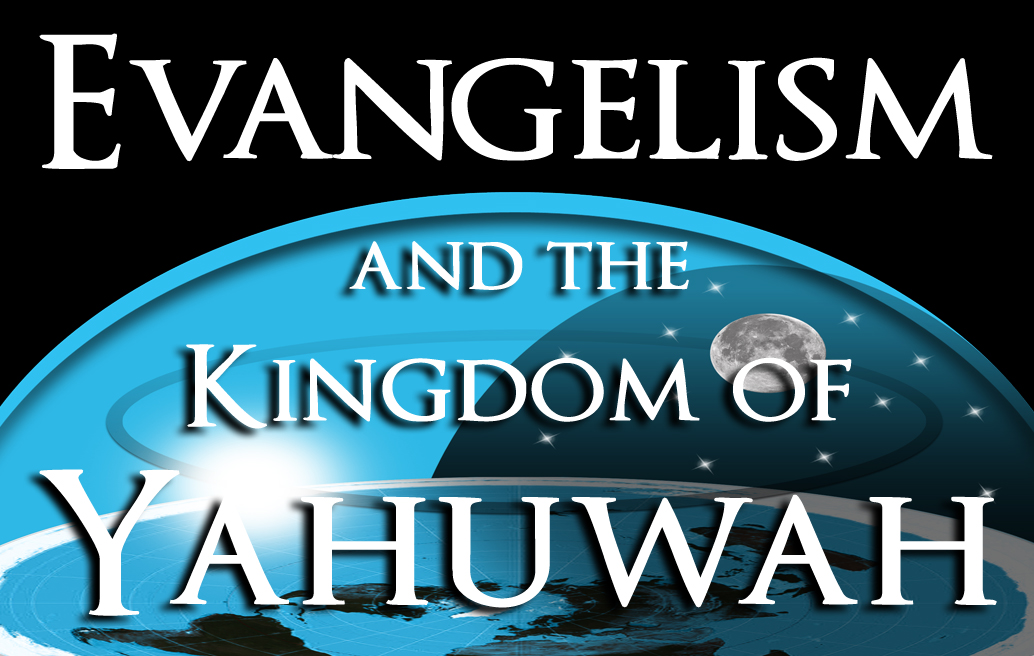
|
This is a non-WLC article. When using resources from outside authors, we only publish the content that is 100% in harmony with the Bible and WLC current biblical beliefs. So such articles can be treated as if coming directly from WLC. We have been greatly blessed by the ministry of many servants of Yahuwah. But we do not advise our members to explore other works by these authors. Such works, we have excluded from publications because they contain errors. Sadly, we have yet to find a ministry that is error-free. If you are shocked by some non-WLC published content [articles/episodes], keep in mind Proverbs 4:18. Our understanding of His truth is evolving, as more light is shed on our pathway. We cherish truth more than life, and seek it wherever it may be found. |

While the Kingdom of Yahuwah was the central theme of all preaching in the New Testament, it has been virtually ignored by modern-day evangelists. This absence of Kingdom-centered evangelism has had devastating effects on the Western church and has now reached critical mass. An anthropocentric gospel of American individualism, which traces its roots back no farther than to the American frontier, has replaced the Yahuwah-centered “gospel of the kingdom.” The deficiency is so great that most evangelists and professors of evangelism would be hard-pressed even to define the “gospel of the kingdom” (Matt. 24:14; Mark 1:14). The result has been a watered-down message that has no power to change lives.
 When John the Baptist came preaching, “Repent, for the kingdom of Yahuwah is at hand!” (Matt. 3:2), his hearers understood he was referring to the eschatological age foretold by Old Testament prophets, a time when Yahuwah would send a promised messianic king to defeat Israel’s enemies and usher in a new age of universal peace. John called people to break with the past as a requirement to enter the Kingdom and escape the coming judgment.
When John the Baptist came preaching, “Repent, for the kingdom of Yahuwah is at hand!” (Matt. 3:2), his hearers understood he was referring to the eschatological age foretold by Old Testament prophets, a time when Yahuwah would send a promised messianic king to defeat Israel’s enemies and usher in a new age of universal peace. John called people to break with the past as a requirement to enter the Kingdom and escape the coming judgment.
After John’s arrest, “Yahushua came preaching the gospel of the kingdom, and saying, ‘The time is fulfilled, and the kingdom of Yahuwah is at hand’” (Mark 1:14-15). Luke tells us that when Yahushua stood in the synagogue and read a messianic passage from the prophet Isaiah, he concluded by saying, “Today this scripture is fulfilled in your hearing” (Luke 4:21). Later, when asked if he were the promised messiah, Yahushua replied, “I am” (Mark 14:62). The waiting period was over. The Kingdom had arrived in Yahushua. It was no longer a distant hope, but it now had a name and a face connected with it.2
Soon after his synagogue discourse, Yahushua told the crowds, “I must preach the kingdom of Yahuwah to other cities also, because for this purpose I have been sent” (Luke 4:43). Everywhere he went he proclaimed the “glad tidings of the kingdom of Yahuwah” (Luke 8:1). The 12 apostles traveled with him.
Is it any wonder as he sent them out, he commissioned them “to preach the kingdom” (Luke 9:1- 2)? Mark’s parallel account of the event says, “So they went out and preached that people should repent” (Mark 6:12), showing the link between the Kingdom and the call to repentance. Yahushua then appointed 70 others to “heal the sick there, and say to them, ‘The kingdom of Yahuwah has come near you’” (Luke 10:1, 9).
The waiting period was over. The Kingdom had arrived in Yahushua. It was no longer a distant hope, but it now had a name and a face connected with it.
|
Prior to his ascension, the resurrected Lord spent 40 days with the apostles “speaking of the things pertaining to the kingdom of Yahuwah” (Acts 1:3). Thus, he ended his earthly ministry the way he began it — declaring the Gospel of the Kingdom!
On the mount, after assuring his followers that there would be a future dimension to the Kingdom, he told them that in the interim they were to be his witnesses (Acts 1:8). Therefore, it is not surprising to find them preaching “the things concerning the kingdom of Yahuwah and the name of Yahushua” (Acts 8:12). The Apostle Paul, likewise, taught “concerning the things of the kingdom of Yahuwah” (Acts 19:8). He reminded the elders at Ephesus that he spent three years “preaching the kingdom of Yahuwah” (Acts 20:25, 31). While under house arrest in Rome, “Many came to him at his lodging, to whom he explained and solemnly testified of the kingdom of Yahuwah” (Acts 28:23). The Book of Acts closes, significantly, with these words, “Then Paul dwelt two whole years in his own rented house and received all who came to him, preaching the kingdom of Yahuwah and teaching the things which concern the Lord Yahushua Christ with all confidence, no one forbidding him” (Acts 28:30-31). There can be little doubt that the Good News of the Kingdom was the central theme of first-century evangelistic preaching. Consequently, it should be our focus as well.
The Gospel is not an invitation to “invite Christ into your heart,” although His Spirit indwells every believer. Neither does the Gospel center on the eternal bliss that awaits believers at death, although every follower of Christ will depart to be with the Lord.3 Few, if any, New Testament sermons deal with heaven. Rather they focus on the Kingdom and what it means to be part of it, now and in the future. The New Testament kerygma [Gospel] announces what Yahuwah has ultimately done in and through Yahushua and invites the hearers to become part of Yahuwah’s great plan for history. It is primarily about Yahuwah, not us.
Additionally, the authentic Gospel is an historical, not an ahistorical or existential message. Through the Old Testament prophets, Yahuwah foretold a time when He would send a mighty deliverer to establish a new covenant with Israel and bring all things in subjection to Himself. All independent kingdoms to which people give their allegiance, both spiritual and material, will be destroyed. Yahushua announced that Yahuwah’s Kingdom had arrived [was at hand], and then he called people to submit to his rule. On the cross he defeated Satan, offered his life as an atonement for sin, and regained dominion over Yahuwah’s creation which Adam had relinquished at the fall. Calvary was Yahuwah’s death blow to Satan’s rule, sin’s power and death’s victory and, hence, it became the “hinge of history.”
At his resurrection, Christ emerged from the cosmic battle victorious, proving that Yahuwah, not the rebels, was in charge. After all, if Yahushua could enter the heart of enemy territory and not be defeated, then their days are numbered!
At his resurrection, Christ emerged from the cosmic battle victorious, proving that Yahuwah, not the rebels, was in charge.
|
From his exalted position at Yahuwah’s right hand, Christ now rules from his throne until his enemies become his footstool (Acts 2:35; 1 Cor. 15:23-24). The powers of evil may still function, but only under the authority of Christ (Col. 2:15; 1:15-16; 1 Cor. 2:6-8). As one theologian remarks, “All kingdoms are confronted with their rightful overlord.”
As sovereign Lord, Christ now directs the course of history toward its victorious completion, i.e. the future establishment of his Kingdom on earth and the judgment of all nations, which will take place at his coming.
Finally the Gospel is corporate in scope as well as individualistic. The Kingdom now finds root in the church. Becoming a citizen of the Kingdom cannot be done in a vacuum, any more than a foreigner can become a citizen of the United States without rubbing shoulders with other Americans. There is a corporate or community aspect to citizenship. It includes responsibility and privileges that cannot be found by living in isolation. Likewise, it is incoherent to say one can enter that reign of Christ and remain outside the church [ekklesia]. The church in turn, spreads the Gospel of the Kingdom to the entire world and summons humanity to submit to Yahuwah’s rule in Christ and align themselves with other believers in his Kingdom. Whenever and wherever the victory of Christ is proclaimed and obeyed, Satan must retreat. As Yahuwah’s rule expands, Satan’s recedes.
It is essential that we re-examine the message we proclaim. Is it the same “gospel of the kingdom” preached by Yahushua and the apostles?

|
For more on this important subject, visit WLC's Content Directory: Yahuwah's Eternal Earthly Kingdom |
1[Title Footnote from Original Article] http://empoweringkingdomgrowth.org/ekg.asp?page=11 2Used with permission of Baptist Press. Emphasis added.
2It was of course very much still also in the future as the great event of the Second Coming — ed.
3We will be “with the Lord” only at the rapture/resurrection (1 Thess. 4:16-17) — ed.